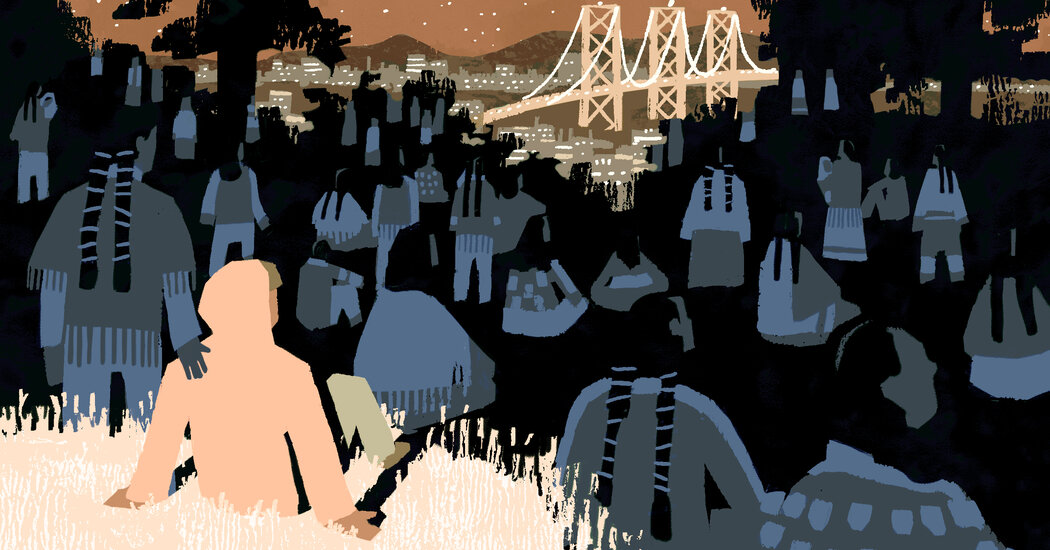WANDERING STARS, by Tommy Orange
Tommy Orange triumphantly returns with “Wandering Stars,” the follow-up to his groundbreaking 2018 debut, “There There.” Part prequel, part sequel, yet wholly standing on its own, Orange’s novel follows the descendants of Jude Star, a Cheyenne survivor of the 1864 Sand Creek massacre, for more than a century and a half, before catching up with the present day and landing in the aftermath of the first book’s harrowing climax.
The novel begins with an address on the American government’s multipronged campaign to eliminate the original “inhabitants of these American lands.” One such campaign came with the slogan “Kill the Indian, Save the Man,” Orange tells us, referring to the boarding schools where Indigenous children were forced to suffer all manners of torture in the name of assimilation.
But, Orange continues, “all the Indian children who were ever Indian children never stopped being Indian children … whose Indian children went on to have Indian children.” In spite of the calculated terror, and the incalculable loss, the government’s campaign failed and could only ever fail. This framing is part of what’s so special about this book: As we move through generations of the family — as Stars become Bear Shields, who become Red Feathers — and even as knowledge of their histories and customs becomes muddled or lost to time and tragedy, Jude Star’s lineage, and that of his people, remains unbroken.
Still, when the novel enters the 21st century, members of the Red Feather family lament society’s apparent refusal to see Native Americans as existing in the present day. While watching an Avengers movie, Lony, the youngest of the Red Feather brothers, imagines what powers a Native American superhero would have. He makes a list that includes “Can Fly (because feathers)” and “Invisibility (because no one knows we’re still here).”
Orange expands his focus on identity to consider the fraught relationship between race and blood. We hear from a high school student named Sean Price, an adoptee raised by white parents, who has just received the results of his DNA test. “He’d already assumed he was part Black,” Orange writes. “There was no mistaking the look you got if you were assumed Black or part Black in a white community — whether you were or were not all or part.”
Blackness, according to Sean, lies in others’ assumptions and becomes most pressingly about how one is perceived and treated. The point is emphasized when Sean and another adoptee friend make a habit of riding the city bus from the Oakland hills down into predominantly Black neighborhoods, where they are unbothered, and where they can “disappear completely” from the white gaze. But given his upbringing, “Sean didn’t feel he had the right to belong to any of what it might mean to be Black from Oakland.”
Sean considers what to make of the DNA results, which reveal European, Native American and African ancestry, and determines that “he couldn’t pretend to now be Native American, not white either, but he would continue to be considered Black, holding the knowledge of his Native American heritage out in front of him like an empty bowl.” Data about his ancestry alone isn’t enough to allow him to feel he can claim it.
Later, Sean seeks guidance from his schoolmate Orvil Red Feather, asking, “So, like, can I say Indian?,” to which Orvil responds, “If you’re Indian.” The novel does not include the percentages that typically accompany these DNA test results, perhaps to dissuade readers from attempting to construct Sean’s identity on his behalf. It’s as if Orange is saying, You can’t decide this for Sean.
It’d be a mistake to think that the power of “Wandering Stars” lies solely in its astute observations, cultural commentary or historical reclamations, though these aspects of the novel would make reading it very much worthwhile. But make no mistake, this book has action! Suspense! The characters are fully formed and they get going right out of the gate. Our first moments with Jude Star are heart-pounding, and our final moments with him, as we find him on the cusp of a decision that will forever change his family’s fate, will make you want to scream “Don’t do it!” The fact that you’ll want to scream “Do it!” just as strongly speaks to the power of Orange’s storytelling abilities.
“There There” fans will be happy to see the return of the half sisters Jacquie and Opal, and to have questions from Orange’s first novel answered. Will the once-estranged Jacquie stick around to help raise her grandsons? Will she relapse again? What led her to run away and leave Opal behind in her teenage years?
As the fallout of colonization and forced assimilation takes its toll on the family, its most definitive impact is addiction. Jude battles alcoholism and, like a family curse, addiction wends its way through his descendants, reaching even the youngest generation of Red Feathers. Sean and Orvil become fast friends, having in common dead mothers, recent hospitalizations and a growing desire to sustain the high they experience via the painkillers they were prescribed for their respective injuries. Add to the boys’ blossoming addictions the fact that Sean’s adoptive father has become a drug dealer and manufacturer with a seemingly endless supply of pain pills on hand, and the friendship becomes a powder keg. It would be easy to reduce this friendship to its toxic elements, but the boys also share a love for musical instruments and a brotherly love for each other that’s difficult to root against.
Orange’s ability to highlight the contradictory forces that coexist within friendships, familial relationships and the characters themselves, who contend with holding private and public identities, makes “Wandering Stars” a towering achievement.
WANDERING STARS | By Tommy Orange | Knopf | 315 pp. | $29


